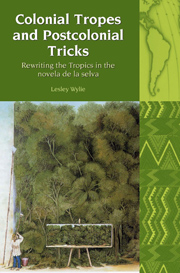Book contents
- Frontmatter
- Contents
- Acknowledgements
- Introduction
- 1 Colonial Tropes and Postcolonial Tricks
- 2 Tropical Nature and Landscape Aesthetics
- 3 Salvaging the Savage
- 4 Paradise Lost: Wilderness and the Limits of Western Escapism
- 5 Jungle Fever: Degeneration as a Trop[olog]ical Disease
- Conclusion
- Bibliography
- Index
4 - Paradise Lost: Wilderness and the Limits of Western Escapism
- Frontmatter
- Contents
- Acknowledgements
- Introduction
- 1 Colonial Tropes and Postcolonial Tricks
- 2 Tropical Nature and Landscape Aesthetics
- 3 Salvaging the Savage
- 4 Paradise Lost: Wilderness and the Limits of Western Escapism
- 5 Jungle Fever: Degeneration as a Trop[olog]ical Disease
- Conclusion
- Bibliography
- Index
Summary
Nature is thoroughly mediate. It is made to serve. It receives the dominion of a man as meekly as the ass on which the Saviour rode. It offers all its kingdoms to man as the raw material which he may mould into what is useful.
Ralph Waldo Emerson, ‘Nature’While chapters 2 and 3 have explored the novela de la selva's engagement with colonial tropes relating to tropical landscape aesthetics and Amerindian culture, this chapter will address how the genre engages with idealized notions of ‘going primitive’ in the jungle in order to debunk the commodification of wild nature in European literature, particularly in Romanticism and colonial adventure novels. Throughout the novela de la selva the urban travellers' meditations on the jungle are often predicated less on experience than on literary antecedent and are infused with neocolonial views of wild nature as a space in which to escape from urban conventions. In these novels the jungle exercises on travellers what the anthropologist Renato Rosaldo has termed ‘imperialist nostalgia’. Almost without exception, the narrators allude to previous adventurers in the wilds of North or South America, and often truss up their own experiences in the rainforest in an antiquated, heroic style. Far from being assimilated into native tribes during their travels in the jungle, the protagonists of the novela de la selva almost always remain outsiders, consistently poeticizing their surroundings and self-styling as Romantic heroes or intrepid explorers.
- Type
- Chapter
- Information
- Colonial Tropes and Postcolonial TricksRewriting the Tropics in the novela de la selva, pp. 95 - 121Publisher: Liverpool University PressPrint publication year: 2009



